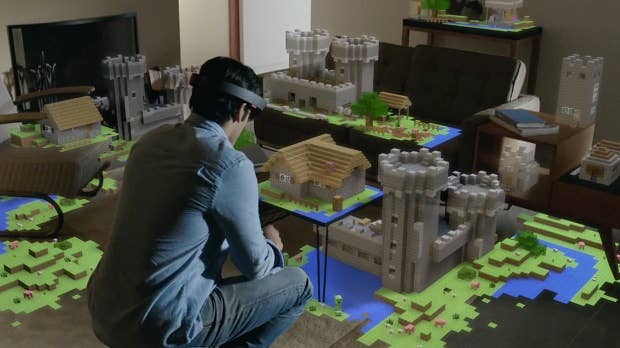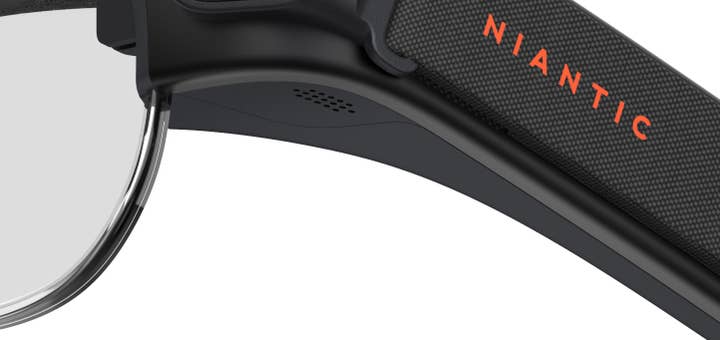The AR hype is building - but success may be years away | Opinion
Rumours of AR product launches from Apple, Niantic and Snap are fuelling belief that a tech revolution is on the way, but enormous problems remain to be solved
For several years leading up to and following the launch of the current wave of VR headsets from Oculus, HTC and the likes, every single year was confidently declared to be the Year of VR.
Even as successive years rolled by and VR continued to be a niche interest -- a fascinating, exciting niche, but unquestionably a niche -- the confidence barely took a dent.
For people involved and invested in this field, the moment when the public at large would finally be persuaded to take the plunge and VR would become an enormous mainstream entertainment sector was eternally just around the corner. The next innovation in software, the next iteration of the hardware; each step forward was a potential tipping point where VR would burst into the mainstream and nothing would ever be the same again.
Things have calmed down a little around VR, and there's a sense that the cooler heads (who were always in the background trying not to roll their eyes at the endless hype) have prevailed, for now. VR remains a hugely exciting frontier, but it's one that's going to take time, and effort, and investment, and an enormous amount of creativity, to push back. It's relatively rare today to find an investor or an executive who wants to bend your ear about how VR is going to be bigger than television, the Internet, or whatever other line of hype they've bought into this week.
VR suffered a plague of evangelists for a while; now it's the turn of Augmented Reality to be evangelised to within an inch of its barely-started life
It's not that the eternal enthusiasts who see technological revolution waiting around every corner have gone away, mind you. It's just that VR is old hat to them now. This year, you see -- and probably next year, and the year after it -- is going to be the year of AR.
If that phrasing betrays a little weariness, forgive me; it's just that I've spent far too much of my life talking to people whose business cards, without a hint of irony, grant them a job title featuring the word "evangelist". VR suffered a plague of evangelists for a while; now it seems that it's the turn of Augmented Reality to be thoroughly and brutally evangelised to within an inch of its barely-started life.
In their favour, it's worth noting that AR isn't exactly a tough sell for an evangelist. It's pretty much already conventional wisdom that AR is a concept with a vastly larger addressable market and much greater potential than VR -- one that will far more readily break out of the confines of an early niche market and become a truly transformative technology. I don't doubt that for a second. The core promise of AR, of the seamless overlaying of virtual content onto our experience of the real world, is one that promises to transform people's lives and interactions as profoundly as smartphones did, if not more so; and from the perspective of video games, the potential to change and enhance the most fundamental aspects of what video games are is perhaps greater than any technological advance since the industry's inception.
I'm not remotely cynical about that future potential for AR. I think it's probably going to be the most exciting technological advance of our lifetimes. I'm just not quite so convinced about exactly when in our lifetimes it's going to happen -- and when the discussion about AR switches from blue-sky talk about grand potential to more grounded questions about how far we actually are away from workable, mass-market products, that's when things seem to get very fuzzy indeed.

Yet if you follow the news around this sector, every few days brings another hint that the revolution is just around the corner. Pokémon Go developer Niantic teased some high-tech glasses of some description a few days ago. Snap apparently has an AR-enabled version of its peculiar Snap Spectacles product in the works. Apple's next big developer event might, or might not, have teased AR glasses in its promotional material (which showed a character wearing glasses with app icons either reflected in the lenses, or projected into the lenses, depending on just how badly you want to believe).
Following the no-smoke-without-fire rationale, then surely this means consumer-ready AR really is just around the corner, right? Even if it's not this year, there's definitely a large mass of people out there who expect Apple to leapfrog the market with a consumer product launch within the next year or two -- but we should know by now that the fact that Cupertino is actively and intensively working on something doesn't necessarily mean it has a short-term consumer product roadmap. Niantic and Snap's possible launches, meanwhile, are both thinly supported rumours about products from companies with little or no hardware experience.
If and when AR really does explode, it will be a defining event for games -- probably a bigger deal both commercially and creatively than smartphones
That's where the soaring hype for AR meets the hard and unforgiving ground; the reality is that AR hardware isn't even up to the point of having an Oculus-type company beavering away in the open on consumer-ready hardware, as VR was back when that hype train got rolling years ago. Magic Leap was the great white hope, but has for all intents and purposes evaporated like the vapour many people suspected it to be; it's no coincidence that AR believers started making grand claims about Apple's plans in the space at the same time that the wheels came off at Magic Leap.
In terms of other players, Microsoft's Hololens remains pretty much the closest we've got to a functional AR product right now, but Microsoft is pretty clear that for the moment it's a product aimed at industry, not consumers -- which is the same place Google has ended up with Glass, a product thoroughly and utterly rejected by consumers at launch that has found a quiet second life as a useful but niche industrial product.
If the comparisons between this situation and VR's status five or six years ago -- lots of interesting burgeoning things on the fringes, but still waiting for any kind of meaningful move into the consumer space -- is fair, one has to wonder if the evolution from here onwards will also look similar. In that case, it wouldn't be surprising to see AR five or six years down the line in a situation where it's beloved by enthusiasts and filled with interesting ideas but by no means quite ready to land on the faces of mainstream consumers en masse.
The comparison isn't exact -- AR will benefit hugely from the past half decade of VR innovation, for one thing -- but the expectation of AR conquering everything before it right from the outset is one that should be examined more critically, no matter how much Apple or other tech giants might be interested in or actively working on the concept.
This raises a bit of a quandry for the video games industry. If and when adoption of AR really does explode, it's going to be a defining event for games -- probably one that would be a bigger deal both commercially and creatively than smartphones were. It's going to be an enormous creative challenge, but the potential for whole new kinds of games and interactions is immense.
Niantic, not unfairly given its accomplishments thus far, sees itself as positioned to be the go-to company for that forthcoming revolution; if it really is working on glasses of its own, that suggests that it's a little impatient for the technology to jump forward to the point where games like Pokémon Go can truly realise their full potential. That's an understandable impatience. Where other companies will be starting from zero with this new technology, Niantic has a small stable of AR games that are unquestionably limited by being on smartphones right now; holding up the phone to see AR objects and characters overlaid through the screen is an unsatisfying experience at best. For Niantic and other companies which are already experimenting in this space, that key technical hurdle -- getting the AR overlays off the phone screen and into a lightweight pair of glasses -- must feel like a dam holding back all their creativity and opportunity.

It's important, however, not to underestimate the challenges AR games will face -- or to fall for the idea that the success of something like Pokémon Go means AR is a solved problem to any extent. Bluntly speaking, I don't really buy the notion of Pokémon Go as an AR game, at least not in the sense that many people think of AR.
The "see Pokémon around you in the real world" gimmick of the game was an interesting hook at first, but it's been far less relevant to the game's medium- to long-term success than its utilisation of map and GPS data, which could have been accomplished without doing any visual AR stuff at all. Many Pokémon Go players -- probably most, though I guess only Niantic knows for sure -- actually turn off the AR function in the game, not least because it's pretty bad for your phone's battery life. The real benefit of AR for Pokémon Go lay in creating viral marketing at the outset, as players shared screenshots of Pokémon in various real-world locations; from a gameplay perspective, most of what it does could be accomplished without any visual AR aspects at all.
One might reasonably argue that what Pokémon Go and other games like it do with map and GPS data is also AR of sorts -- that the "overlaying digital data onto reality" aspects of AR don't necessarily have to involve putting visual overlays onto screens or glasses, but can be something more abstract, like turning real-world locations into Pokéstops. For the most part, though, when we talk about AR we're talking about visual overlays -- and that's an area where, so far, there's no hardware product that does a particularly good job, and no game software that's even really begun to tackle the challenges and opportunities of this as-yet poorly defined medium.
AR will be a transformational technology, and games will be part of that -- but the timeline for its success will be longer than most people assume, and the hurdles that need to be surmounted will be higher, too. It's great that companies like Niantic are already thinking about and working on those challenges -- and I hope plenty of other companies in the industry have their eye closely on where this sector is going, because god knows enough major firms missed the smartphone train entirely and ended up spending billions on acquisitions to try to catch up later.
But the failure of Magic Leap and the pivots to industrial usage of Glass and Hololens should serve as a sobering note. We're likely to have quite a few years of AR hype before this becomes a remotely realistic mass-market platform.

